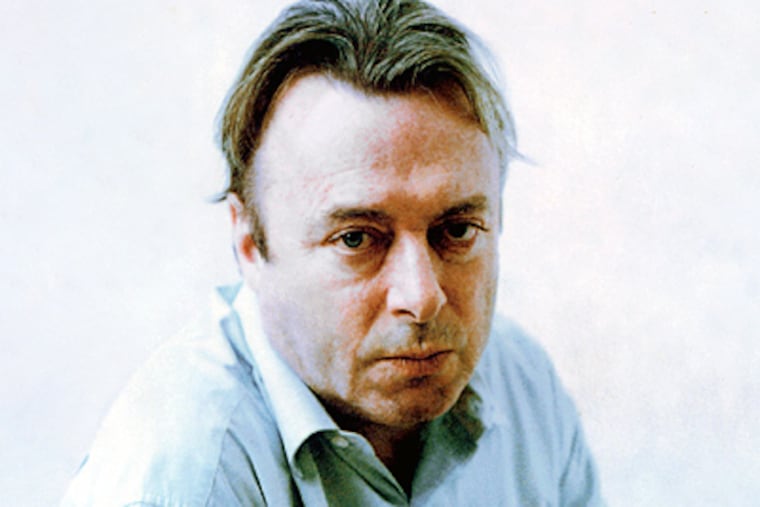
British-born essayist, social critic, and political pundit Christopher Hitchens died Thursday in Houston of complications from esophageal cancer, according to a statement from Vanity Fair, where he was a contributing editor. He was 62.
"[He was] a man of ferocious intellect," said Vanity Fair editor Graydon Carter. "There will never be another like Christopher. . . . Those who read him felt they knew him, and those who knew him were profoundly fortunate souls."
Considered one of the world's most influential public intellectuals, Mr. Hitchens was a hit on the lecture circuit and a frequent guest on news shows, earning a reputation as a fierce contrarian. He was notorious for his divisive opinions on religion (he was an avowed atheist), his unwavering support of the Iraq war, and his anti-Zionism.
Novelist Salman Rushdie on Friday tweeted, "Goodbye, my beloved friend. A great voice falls silent. A great heart stops."
In death, no less than in life, Mr. Hitchens divided opinion. Most agree that he was a fine writer regardless of his ideology.
"His contribution to the public debate can't be measured," said Philadelphia linguist and political analyst William Lutz . "I didn't agree with a lot of his positions, but he's mandatory reading. He is an outstanding writer and stylist, engaging, literate, and witty. . . . Everything you'd want if you want to be an essayist."
Lutz, author of Doublespeak, said Mr. Hitchens was steadfast in his beliefs, however unpopular. "He was fearless in the subject matters that he chose . . . to write about," said Lutz. "How many writers declare Mother Teresa was a fraud and a fake?" (In a 1995 book, Mr. Hitchens attacked Mother Teresa as a political opportunist who spread an extremist religious ideology.)
In a radically different assessment, journalist and political analyst Chris Hedges, who had taken on Mr. Hitchens in a public debate, described him as a man who squandered his talent in exchange for fame.
"The tragedy of Hitchens was that he had the intellect to do something great, but he used his creative gifts for self-promotion throughout his career," Hedges, author of Death of the Liberal Class, said. "He sacrificed nuance for the sound bite."
Adds Hedges, "I don't think he contributed anything to the nation's intellectual life."
Mr. Hitchens was born in 1949 in Portsmouth in southern England, and educated at Oxford University, where he studied economics, political science, and philosophy. He graduated in 1970, with a less-than-exemplary "third class" degree before embarking on a career in journalism.
An avowed leftist and activist, Mr. Hitchens wrote for the Trotskyite magazine International Socialism. He was arrested numerous times for taking part in civil rights and anti-nukes protests. A vocal opponent of the Vietnam War, he attacked former Secretary of State Henry Kissinger as a war criminal in his 2001 book The Trial of Henry Kissinger.
After moving to America in 1981, Mr. Hitchens established himself as a left-wing polemicist extraordinaire, contributing literary criticism and political tracts to the Nation, the Atlantic, Slate, World Affairs, the Nation, Free Inquiry, and Vanity Fair, which hired him in 1992.
He published widely, with books on history (Thomas Jefferson: Author of America), literature (Love, Poverty, and War: Journeys and Essays), religion (God Is Not Great: How Religion Poisons Everything), and a hefty memoir, (Hitch-22).
Mr. Hitchens retained his British citizenship, but in 2007, he also adopted American citizenship at a ceremony on the steps of the Jefferson Memorial presided over by Secretary of Homeland Security Michael Chertoff.
By then, Mr. Hitchens, who was a vocal booster for war in Iraq, had become persona non grata with many on the left.
Mr. Hitchens' turn away from his old allies began in 1989, when he criticized liberal intellectuals for what he viewed as their lukewarm reaction when Iran's religious leader Ayatollah Ruhollah Khomeini issued a fatwa calling on all Muslims to kill Rushdie for allegedly demeaning Islam in his novel The Satanic Verses.
The Sept. 11 attacks ignited a renewed political fervor in Mr. Hitchens, who denounced the ideology of al-Qaeda and other radical Islamists as "fascism with an Islamic face."
To the growing alarm of his colleagues, Mr. Hitchens wrote positively of the interventionist position advocated by Paul Wolfowitz and implemented by the administration of President George W. Bush.
In Hitch-22, Mr. Hitchens maintained that he supported the war and other interventionist actions because of a moral imperative to free people from totalitarianism.
He made similar arguments in his call for intervention in the Balkans and the Darfur region of Sudan and in his criticism of Israel's treatment of Palestinians.
Admirers and critics alike have been disarmed by Mr. Hitchens' final series of essays, a poignant, yet clear-eyed look at his cancer and his impending death and his resolve to continue thinking and writing.
"I . . . still, try to nurture that little flame of curiosity and defiance," he wrote in Vanity Fair, "willing to play out the string to the end and wishing to be spared nothing that properly belongs to a life span."
Mr. Hitchens is survived by his wife, Carol Blue, and their daughter, Antonia, and his children from a previous marriage, Alexander and Sophia.